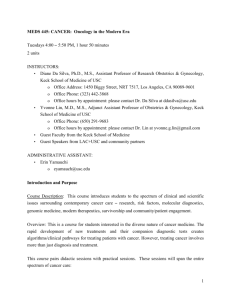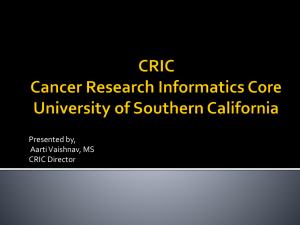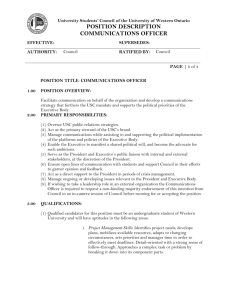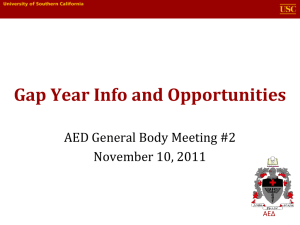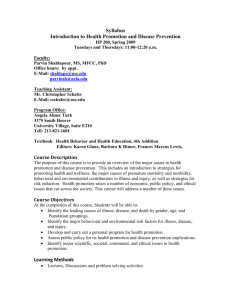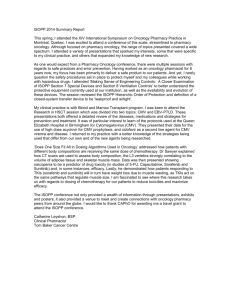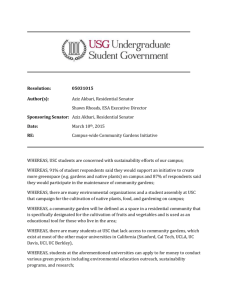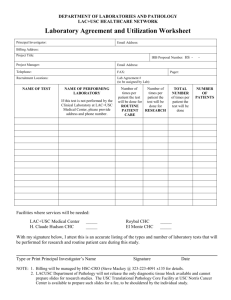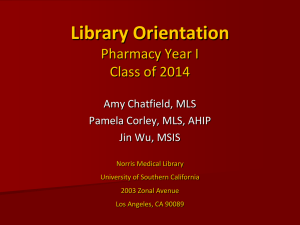MEDS 445: CANCER: Oncology in the Modern Era Weekday TBA 1
advertisement
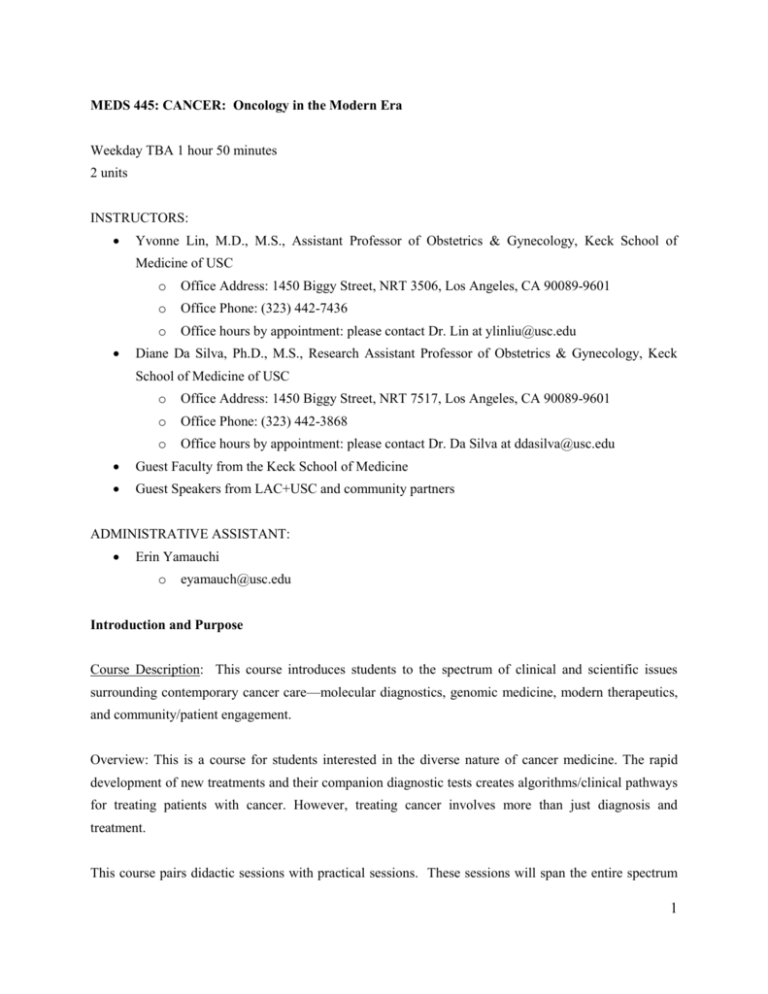
MEDS 445: CANCER: Oncology in the Modern Era Weekday TBA 1 hour 50 minutes 2 units INSTRUCTORS: Yvonne Lin, M.D., M.S., Assistant Professor of Obstetrics & Gynecology, Keck School of Medicine of USC o Office Address: 1450 Biggy Street, NRT 3506, Los Angeles, CA 90089-9601 o Office Phone: (323) 442-7436 o Office hours by appointment: please contact Dr. Lin at ylinliu@usc.edu Diane Da Silva, Ph.D., M.S., Research Assistant Professor of Obstetrics & Gynecology, Keck School of Medicine of USC o Office Address: 1450 Biggy Street, NRT 7517, Los Angeles, CA 90089-9601 o Office Phone: (323) 442-3868 o Office hours by appointment: please contact Dr. Da Silva at ddasilva@usc.edu Guest Faculty from the Keck School of Medicine Guest Speakers from LAC+USC and community partners ADMINISTRATIVE ASSISTANT: Erin Yamauchi o eyamauch@usc.edu Introduction and Purpose Course Description: This course introduces students to the spectrum of clinical and scientific issues surrounding contemporary cancer care—molecular diagnostics, genomic medicine, modern therapeutics, and community/patient engagement. Overview: This is a course for students interested in the diverse nature of cancer medicine. The rapid development of new treatments and their companion diagnostic tests creates algorithms/clinical pathways for treating patients with cancer. However, treating cancer involves more than just diagnosis and treatment. This course pairs didactic sessions with practical sessions. These sessions will span the entire spectrum 1 of cancer care: 1. Non‐ clinical: Medical Informatics; Biotechnology diagnostic tools (use, integration into clinical care); Biotechnology therapeutic development (how does a new drug come onto the market?); Practicalities of oncology drug development; Philanthropy of cancer care. 2. Clinical: Prevention programs (Community, HMO, Private sector); DPH Public sector; Clinical trial development; Women’s Cancer; Surgical Oncology; Psychiatry; Cancer; Genetics; End‐ of‐ life/Hospice care Topics covered in this course will cover 4 cancer-related themes: 1. Cancer Screening & Prevention 2. Cancer Genetics 3. Cancer Therapies 4. Cancer Clinical Care Upon successful completion of this course, the student should be able to demonstrate a working knowledge of: The importance of bridging basic molecular research with personalized patient care Evaluation and application of population-based methods used in contemporary oncology Critical interpretation of clinical trials in oncology: preventive and therapeutic Hands-on experience as a cancer care provider in the community, for example in patient advocacy, philanthropy, education, research, or clinical care. Course Requirements and Grades Course prerequisites: MEDS-220, BISC220L. Recommended: BISC150L, BISC221L There is no required textbook for the course. Course material will be drawn from a variety of sources and catalogued on-line using the on-line learning management system. Course materials include a selection of articles from the peer-reviewed medical literature. These required readings are listed below under Class Sessions. The course will consist of one 50 minute class meeting each week, which will involve a dynamic combination of lecture, class discussion and special guests. The other 60 minutes (minimum) should be scheduled by the student with the project mentor for the hands-on experience. Prior to each class meeting, students will receive communication with material to read, listen to, 2 and/or watch in preparation for the session. Students will be expected to be able to discuss the material during class. Final Project/Practicum: Students will be paired up with a pre-selected list of mentors belonging to a program/group/company/research lab that has a “short‐ term” project. The Student will participate in all planning aspects of this project to gain practical experience and should spend 1 hour minimum per week averaged across 4 weeks working with the project mentor. Last 2 class sessions, students will present (15‐ 20 min) their project, why they picked it, what their role was, and what the outcome was. Students may also find a project/project mentor on their own, but must get pre-approval from course instructors. Examples of projects are philanthropy, molecular diagnostics, clinical care, patient advocacy, laboratory research, community outreach and education, and hospice care. A 1-2 page written report summarizing the Student’s hands-on experience will be due on the last day of class. Grading: o Practicum progress reports (4 written reports submitted every 3 weeks): 10% each (total 40%) o Class participation: 15% o Mentor evaluation (2 reports submitted at 7 weeks and at end of course): 5% each (total 10%) o Presentation (20%) and written report (15%) of final project Grading Scale: A 94-100 A90-93 B+ 87-89 B 83-86 B80-82 C+ 77-79 C 75-76 C74-70 D+ 69-67 D 66-64 D63-60 F 59-0 Class sessions: 15 Sessions (50 minutes each) Total: Week 1 : Orientation: Expectations, Requirements, Format i. a. Non‐ clinical vs. Clinical Overview 3 ii. b. Sign-up for final project topic by end of week #2 Theme: Cancer Screening Week 2: Community Cancer Screenings Required reading: 1. DeVita VT and Rosenberg SA. (2012). Two Hundred Years of Cancer Research. N Engl J Med 366: 2207-2214. 2. Wolosin S et al. (2012). Cancer Screening Campaigns – Getting past Uninformative Persuasion. N Engl J Med 367:1677-1679 Week 3: Molecular diagnostics and Screening tools Required reading: 1. Bretthauer M and Kalager M (2013). Principles, effectiveness and caveats in screening for cancer. Br J Surgery 100:55-65. 2. Schiffman M and Solomon D. (2013). Cervical cancer screening with human papillomavirus and cytologic cotesting. N Engl J Med 369:2324-2331. Week 4: Prevention programs and education Required reading: 1. Dalton WS et al. (2010). The 2010 Health Care Reform Act: A potential opportunity to advance cancer research by taking cancer personally. Clin Cancer Res. 16:59875996. Theme: Cancer Genetics Week 5: Population-based Registries Required reading: 1. Siegel R et al. (2012). Cancer treatment and survivorship statistics. CA Cancer J Clin 62:220-241. 2. Park HS et al. (2012). Overview of the Surveillance, Epidemiology, and End Results database: evolution, data variables, and quality assurance. Curr Probl Cancer 36:183190. Week 6: Epidemiological research and molecular oncology Required reading: 1. Feero WG et al. (2010). Genomic Medicine – An Updated Primer. N Engl J Med 4 362:2001-2011. 2. McDermott U et al. (2011). Genomics and the Continuum of Cancer Care. N Engl J Med. 364: 340-350. Week 7: Genetic testing, early detection and risk factors Required reading: 1. Aparicio S and Caldas C. (2013). The Implications of Clonal Genome Evolution for Cancer Medicine. N Engl J Med 368: 842-851. 2. Olopade OI et al. (2008). Advances in Breast Cancer: Pathways to Personalized Medicine. Clin Cancer Res 14:7988-7999. Theme: Cancer Therapies Week 8: Translational Research Required reading: 1. George SL (2008). Statistical issues in translational cancer research. Clin Cancer Res 14:5954-5958. 2. Butler D (2008). Crossing the valley of death. Nature 453:840-842 Week 9: Clinical trials Required reading: 1. Berry DA (2011). Adaptive clinical trials in oncology. Nat Rev Clin Oncol 9:199207. 2. LoRusso PM et al. (2010). Making the investigational oncology pipeline more efficient and effective: Are we headed in the right direction? Clin Cancer Res. 16:5956-5962. Week 10: Predictive Biomarkers and Personalized Medicine Required reading: 1. Harper AR and Topol EJ. (2012). Pharmacogenomics in clinical practice and drug development. Nat. Biotechnology 30:1117-24. Theme: Cancer Clinical Care Week 11: Clinical Oncology: Who’s Involved and what happens? Required reading: 1. Holohan C et al. (2013). Cancer drug resistance: an evolving paradigm. Nat Rev 5 Cancer 13:714-26. 2. Jeruss JS and Woodruff TK. (2009). Preservation of Fertility in Patients with Cancer. N Engl J Med. 360: 902-11. Week 12: Philanthropy of Cancer Research and Cancer Care Required reading: 1. Tesler LE and Malone RE (2008). Corporate philanthropy, lobbying and public health policy. Am J Public Health 98:2123-33. Week 13: End of Life Care/Palliative Care Required reading: 1. Parikh RB et al.(2013). Early Specialty Palliative Care—Translating Data in Oncology into Practice. N Engl J Med 369: 2347-51. 2. Greer JA (2013). Early integration of palliative care services with standard oncology care for patients with advanced cancer. CA Cancer J Clin 63:349-63. Concluding Sessions Week 14: Student Presentations #1 Week 15: Student Presentations #2 Statement for Students with Disabilities Any student requesting academic accommodations based on a disability is required to register with Disability Services and Programs (DSP) each semester. A letter of verification for approved accommodations can be obtained from DSP. Please be sure the letter is delivered to Dr. Lew as early in the semester as possible. DSP is located in STU 301 and is open 8:30 a.m.–5:00 p.m., Monday through Friday. The phone number for DSP is (213) 740-0776. Statement on Academic Integrity USC seeks to maintain an optimal learning environment. General principles of academic honesty include the concept of respect for the intellectual property of others, the expectation that individual work will be submitted unless otherwise allowed by an instructor, and the obligations both to protect one’s own academic work from misuse by others as well as to avoid using another’s work as one’s own. All students are expected to understand and abide by these principles. Scampus, the Student Guidebook, contains the 6 Student Conduct Code in Section 11.00, while the recommended sanctions are located in Appendix A: http://www.usc.edu/dept/publications/SCAMPUS/gov/. Students will be referred to the Office of Student Judicial Affairs and Community Standards for further review, should there be any suspicion of academic dishonesty. The Review process can be found at: http://www.usc.edu/student-affairs/SJACS/.. Emergency Preparedness/Course Continuity: In case of emergency, and travel to campus is difficult, USC executive leadership will announce an electronic way for instructors to teach students in their residence halls or homes using a combination of Blackboard, teleconferencing, and other technologies. Instructors should be prepared to assign students a "Plan B" project that can be completed at a distance. For additional information about maintaining your classes in an emergency please access: http://cst.usc.edu/services/emergencyprep.html Please activate your course in Blackboard with access to the course syllabus. Whether or not you use Blackboard regularly these preparations will be crucial in an emergency. USC's Blackboard learning management system and support information is available at blackboard.usc.edu. 7
